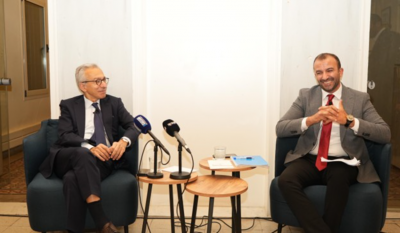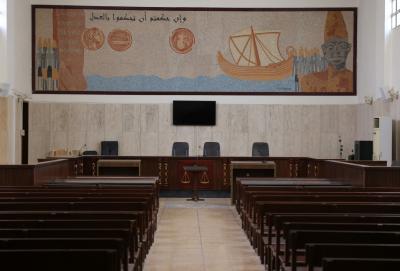In a world marked by accelerating events and a widening gap between international slogans and realities on the ground, the issue of global citizenship education resurfaces — not merely as a school subject, but as a worldwide imperative where politics meets pedagogy, and economics intersects with sustainable development.
In countries where civil peace is established, citizenship education tends to be naturally integrated into school curricula and effectively practiced in societies bound by shared traditions and inherited values. But to what extent does this model apply to Lebanon? And how can history be interpreted as a path toward civil — and eventually global — citizenship?
The concept of citizenship education is far from new. Since the days of the Greeks and Carthaginians, the notion of cultivating a "good citizen" has existed. Aristotle himself believed that the ideal city could not be built without proper education. This principle remains relevant today, with “global citizenship” emerging as an educational necessity to address global challenges — from war and migration to extremism and identity conflicts.
According to Professor Fernando Reimers of Harvard University, one of the leading voices in global education, schools must move beyond the mere transmission of academic content. They must equip students with the ability to engage actively in public life and understand pressing global issues such as poverty, inequality, conflict, and human rights. In his writings, Reimers harshly criticizes educational institutions that have failed to bridge the gap between educational objectives and real-world application. He insists that schools must begin with learners’ realities and connect them meaningfully to global concerns.
But how does this rhetoric align with reality? Is global citizenship a tangible goal or just another idealistic catchphrase floated at international conferences? The late political theorist Samuel Huntington offered a more pessimistic view, warning that the next great conflict would not be economic or ideological, but cultural — a "clash of civilizations." And indeed, the current wars in Gaza, Lebanon, and Ukraine show that modern conflicts are complex, fueled by a mix of religious motives, economic interests, and security agendas. Against this backdrop, global citizenship appears utopian — unless tied to critical awareness and grounded strategies that acknowledge the intricacies of the international order.
Reimers calls on schools to foster tolerance, empathy, and acceptance. Yet the current educational landscape reveals a fragmented picture. Many institutions prioritize economic competition, others promote nationalist sentiment, and some even teach hatred under the guise of religion or patriotism. The painful reality is that two children growing up in today’s world might receive opposite messages: one is taught to uphold human rights, the other to reject or even fight the “other.”
This is where the roles of the family and media become vital, as partners in shaping future citizens. However, the lack of a unified vision, poor coordination, and the politicization of educational values make citizenship education a complex endeavor.
In Lebanon, some secular schools attempt to introduce themes of sustainable development and global citizenship. However, they face resistance from outdated curricula and deeply entrenched political and sectarian identities. Meanwhile, UNESCO — the very institution meant to champion this mission globally — has increasingly prioritized quantitative access to education over its qualitative essence and core values.
It is worth remembering that Lebanon was once a pioneer back in the 1960s and 70s, when students from diverse religious backgrounds studied civic education together. This curriculum helped shape baby boomer citizens who respected family, civil laws, personal and social ethics, patriotism, and the spirit of sacrifice. Back then, civics education taught a unified version of history, fostering a collective narrative about the nation’s origins. But the outbreak of civil war dismantled those efforts. Internal and external civic values eroded, sectarian divisions deepened into open conflict, and the seeds of corruption took root, eventually destroying the nation’s unity and disconnecting it from the global community.
Today, global institutions like the World Bank and even the United Nations have failed to prioritize global citizenship in any meaningful way. It remains a vague, under-implemented concept in national education policies. The very definition of “universal values” is still hotly contested, especially in non-democratic states where discussions around equality and justice are perceived as political threats.
The pressing question remains: Can we truly cultivate a "global citizen" without erasing local or national identity? How can we balance loyalty to the homeland with openness to the world and its diversity? This challenge becomes even more complex amid the rise of populist and nationalist rhetoric — from Donald Trump’s anti-immigration stance to racially coded policies disguised as “border security.”
Citizenship cannot be reduced to lofty slogans. It is a long-term project that begins in classrooms, is reinforced at home and in society, and requires a strategic vision, clear values, and realistic expectations that respect cultural and political diversity across nations. Teaching citizenship will not, on its own, bring about world peace. But it can help reduce tensions and foster a generation that prefers dialogue over violence and believes in social justice.
Global citizenship can only become a reality under certain conditions: conceptual clarity, value consensus, political will, supportive families, and schools committed to building responsible national and global citizens. Without these, the discourse remains hollow, and we will keep asking the same question: Is global citizenship a hope we strive for, or a mirage we chase?
In conclusion, it is vital to reintegrate civic education into school programs as a foundational step toward rebuilding the good citizen, one who can contribute meaningfully to both their country and the global society. Perhaps then, future generations may learn to avoid destructive practices, chief among them, the corruption that has steadily eroded Lebanon’s national identity over the past five decades.
Please post your comments on:
[email protected]
 Politics
Politics













